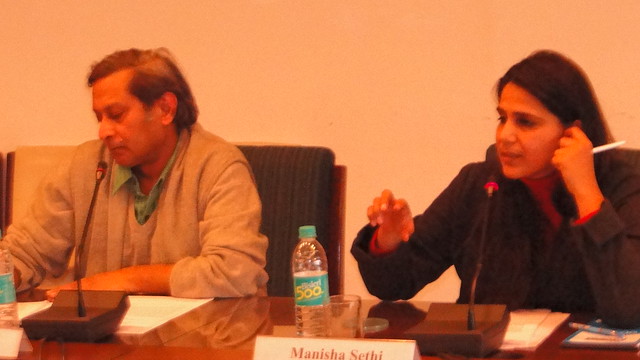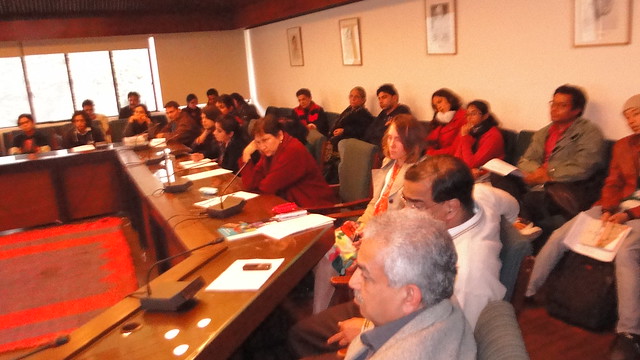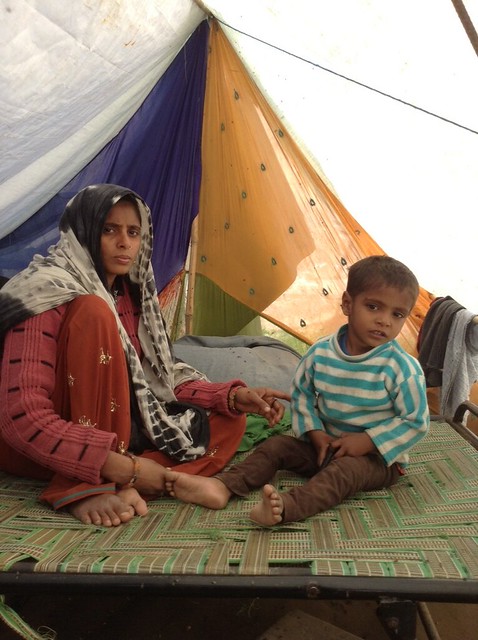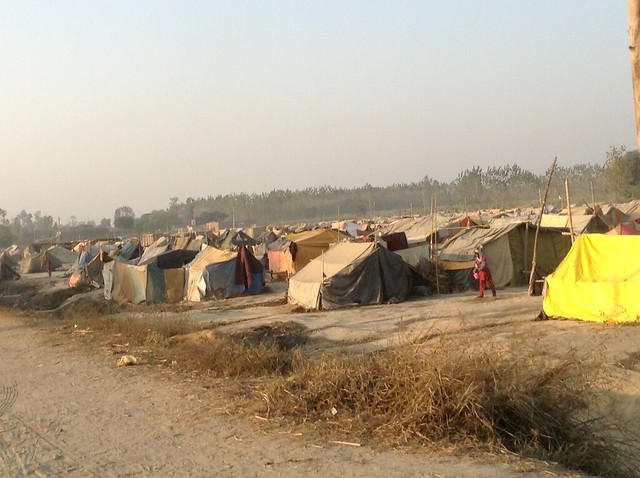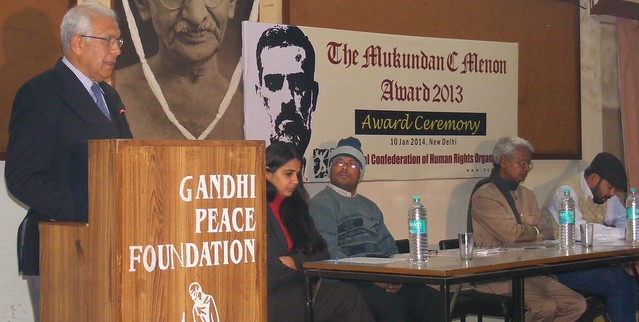By TCN News,
New Delhi: A five member fact finding team of Peoples Union for Democratic Rights (PUDR) visited the relief camps in Muzaffarnagar and Shamli, between 28th and 30th December 2013, to get a first-hand account of the condition and problems faced by people living in these camps.
Following the unprecedented outbreak of riots in the rural areas of Muzaffarnagar, Shamli, Baghpat, Meerut and Saharanpur districts of Uttar Pradesh in the first week of September, tens of thousands of Muslim families have been living in relief camps for the last four months. However, over the past week, the Uttar Pradesh Government has been following a policy of forced closure and eviction of people from such camps. As a consequence, the situation created has resulted in increasing the vulnerabilities and insecurities of persons affected by the riots.
![]()
The team visited a total of 8 camps in the districts of Shamli and Muzaffarnagar and met people from over 60 villages. In Shamli District, the team visited the camps at Malakpur, Barnavi, Kandhla, and Madarsa camp in Shamli town. In Muzaffarnagar district, the team visited the camps at Loyi, Shahpur, Jogiya-kheda and Jaula. In addition, the team also met people from 5 other camps. In all PUDR interacted with people of 13 camps. The team also met the DM Shamli, ADM Muzaffarnagar, SHO of P.S. Phugana, Village Pradhans of Loyi and Jogiya-kheda, health workers, teachers, journalists, members of religious communities, relief camp committee members and relief workers associated with various non-governmental organizations.
The following is a summary of the main findings of the team.
1. Forcible eviction of the riot affected from the relief camps
The hearing of the matter by the Supreme Court and the increased media reporting of the plight of the victims in the camps has had a paradoxical impact. The administration is determined to close down the camps. Various methods are being deployed towards this end. These include the filing of cases against the victims residing in these camps for trespassing on government property; pressurising relief committee members; large-scale police and official presence to browbeat people into leaving the premises; and breaking up the large settlements of victims to facilitate in this pressurising.
In the case of Loyi camp, over a hundred families from Kharad village still awaiting rehabilitation payment were being moved to a government barrack temporary accomodation, on 29th-30th December, ostensibly to provide them with better care and facilities. Other families were being told to clear out of the camp even when they were insecure about returning to their village. This insecurity is worse when those responsible for conducting attacks are not charged for the crimes or even when accused continue to be free to intimidate the victims.
![]()
2. Apathy in Provision of Relief by Government Agencies
Our team found that none of the relief camps were initiated or managed by the government. Relief camps came up in Muslim majority villages to which the victims fled during the rioting.
In every camp visited, we were repeatedly told about the apathy on the part of the State administration to supply relief material and services. It was only a fortnight after the start of these camps that the administration started providing relief materials. After 1 October the administration even stopped providing food in most of these camps, which we confirmed at the Jaula and Jogiya-kheda camps. With winter approaching and a Supreme court order of 21 November explicitly calling upon the administration to resume supply of relief material, the Administration did not make any attempts to distribute woollen clothes and blankets for people residing in the camps. It was only in December, when the petitioners drew attention to 39 deaths in the relief camps, that the administration resumed supply of medicines and 200ml of milk per family in 5 camps.
The camps also house a large number of school-going children. While in some places, services of a primary school have been provided, students from higher classes have nowhere to go. Schools in the close vicinity have refused admission to the riot affected. Girl students face this in a more aggravated form. Those having to take the board exams this year have already missed some examinations. Such students face the imminent loss of a year that may effectively deny them futher education.
Medical facilities are primitive. A meagre stock of pills are being distributed at most camps. The DM Shamli expressed inability to provide any better services lamenting the sorry state of the district health-care system. Many pregnant women have given birth and many are in late stages of pregnancy. No services of a gynaecologist are available anywhere in the district and there has been no attempt to provide nutritious food for these mothers. A Committee set up under the directions of the Supreme Court to look into the deaths in relief camps reported 34 deaths of children.
3. The Current number of Relief Camps is under-reported by the State Government
In an affidavit filed before the Supreme Court in December, the State government had stated that out of the 58 camps in operation in September, 53 had been discontinued and only 5 camps were in existence (4 in Shamli and 1 in Muzaffarnagar districts). Our team found this assertion to be wholly false.
We were told by informed residents that relief camps were in operation at 25 villages, some of them housing more than one camp. Our team was able to visit 13 of these locations and found camps in operation. The number of people receiving relief from these camps far exceeds the number of people present in the camps, since many victims have been moved to private houses in the villages in the light of the extreme weather conditions.
The assertion by the ADM Muzaffarnagar to our team on 30 December at the Loyi camp was most shocking. He claimed that there was no relief camp at Shahpur village. An hour later our team found three functioning relief camps at the village!
The exclusion of a large number of camps from the official list merely highlights the callous attitude of the administration by denying all relief to these victims and leaving such people wholly at the mercy of private charity. It is a blatant attempt to misinform the public at large.
![]()
4. Misleading Estimates of People Affected by the Riots
The lack of supervision of the relief camps by the district administration has meant that figures of the riot affected are arbitrary. In a report dated 4 October 2013, filed by the Harmony Committee constituted by the Uttar Pradesh government, the total number of internally displaced was estimated to be 33,696 persons. Of this the largest segment of displaced people approximately 74 percent were reported to be living in relief camps located in Muzaffanagar district, followed by 22 percent in Kairana, 3.3 percent in Shamli and 0.7 percent in Bagpat. By December, the number stated in the government affidavit to the Supreme Court is 5,024.
The falsity of the above claim is apparent from the records of residents available at the relief camps. The relief committees running the camps provide the only proper record of victims based on the distribution of material relief at each camp.
According to additional affidavit filed on behalf of the petitioners in the case of Citizen for Justice & Peace and others v. State of Uttar Pradesh (petition no. 170 of 2013) the total number of persons living in camps as of the 6 December was 27, 882. Our estimate of the displaced persons from our visit to 13 camps more or less confirms this figure.
5. Flawed Categorization of ‘Riot Affected’ Villages and Persons
We were told by relief committees that families from 162 villages had abandoned their homes and sought refuge in the relief camps. Our team was able to speak to riot victims displaced from over 60 villages. Officially however only 9 villages have been declared as being riot affected, and therefore eligible for Government rehabilitation package. Based on a criteria of worst affected in terms of murders, the 9 villages identified are: Lak, Lisaad, Bahawdi, Kutba, Kutbi, Phugana, Mohammadpur Raisingh, Kakra and Mundbhar. As per the Government package, approximately 1800 families have been identified as riot affected and eligible for a one time rehabilitation package of Rs. 5,00,000 from these villages.
But there exist a large number of persons, beyond the nine government recognised villages, who are in no situation to return to their homes. They have faced serious intimidation and humiliation from their Hindu neighbours. They have suffered their houses being broken into and women humiliated by armed mobs. They have found their homes ransacked when they visited the village with police escort. And in some cases their family members who were unable to flee are still missing, three months after the incident. These villages and their Muslim residents are not being categorized as the riot affected and thus rendered ineligible for rehabilitation. Many of these persons that our team interviewed, recounted having fled empty-handed from their homes on the night of 7 and 8 September.
6. Problematic Rehabilitation Package and its Terms
The State Government’s one-time rehabilitation package of Rs. 5 lakhs for each riot affected family is extremely problematic. This package is based neither on the size of the house in the village, nor is it based on the number of families residing in the house. Hence every resident riot affected family of the 9 villages has not been provided the amount of Rs. 5 lakhs. Multiple families residing in the same house face this problem most acutely where the head of one family has been paid while others have been denied.
The terms of this rehabilitation require beneficiaries to return the Rs. 5 lakh if they were ever to move back into their original homes. Given the present situation of the victims living in tents under the open sky, with little hope of returning to their homes, acceptance of this rehabilitation is a fait accompli. Once the money is brought into use, the labouring households that comprise an overwhelming majority of the victims shall never be in a position to return it. In this manner the government policy effectively ensures that the victims are forbidden to return. The rehabilitation package is therefore in essence a compensation package that fails in every respect to compensate for the losses suffered by the victims.
On the reverse side, the government has made no commitments to protect the houses and community properties of the victims that comprise masjids, idgahs, madrassas and graveyards. Therefore these properties would over time willy nilly fall into the hands of those who perpetrated the violence against the Muslim victims, thereby creating an economic incentive for future communal violence.
What is lost sight of in this process is the culpability of the state. The overwhelming reason for the inability of the victims to return to their lives is the government’s failure to protect them from communal violence; to apprehend and punish the perpetrators; and refusal to provide effective security to them. The rehabilitation package therefore becomes a ploy to hide this abysmal failure.
![]()
7. Slow progress of Police investigation of complaints related to Murder, Rape, Arson and Looting
It has come to the knowledge of the fact finding team that the police is deliberately trying to distort evidence and delay investigations in a number of cases. As a result, the maximum of 90 days period allowed for investigation under section 167(2) of the Cr.P.C. is passing by and persons accused of heinous crimes get a right to be freed on bail. As per the additional affidavit filed on behalf of the petitioners in the case of Citizen for Justice & Peace and others v. State of Uttar Pradesh (petition no. 170 of 2013), atleast 5 persons arrested for heinous crimes are already out on bail and those named as accused in FIRs cannot be arrested without a court warrant due to the delay. The following cases indicate towards a dubious role of the police in conducting the investigation.
Killing of Meherudeen (father of Rafeeq) from Dunger village, Phugana Thana, Muzaffarnagar district is a case in point. Meherudeen's body was found hung by the neck, naked in the house of co-villager Pawan Jat on 8 September 2013. Under pressure from village head Ramchandra and other powerful Jats of the village, the body was buried in the graveyard near the village. Today, the family members say that Meherudeen died because of illness. The family has now left the camp and is residing in Kandhla. But three people from the same village have been witness to the entire episode and they find mention in the FIR. They are also being threatened to death in case they testify. Their testimonies have been video-recorded and submitted along with the FIR. An application has also been written to the police authorities requesting post-mortem of the body, but in vain. According to law, the police is required to record a Panchnama upon reaching the incident site, and to record the cause of death as stated by the family. However, in this case, the Panchnama was not created. Even after the FIR was filed, the body has not been exhumed and sent for post-mortem.
Another case in point is that of Aamir Khan s/o Raisuddin from Anchhad village, Thana Binauli, District Baghpat. On 8 September 2013, Aamir and his family including his father, mother, wife and younger brother left the village out of fear and moved to their relative's house in Shieikhpura. On the morning of 12 September 2013, after consulting with family members, Aamir cycled back to his village to see if things had normalised. When Aamir did not return till late evening, his father, mother and wife decided to go and check. They reached their house around 6pm, and found Aamir's body hung by his neck from the ceiling. On hearing their screams many villagers gathered and the village head was also called. Two villagers, Sanjeev and his father Jagbeera, started abusing the family and demanded the return of a loan of Rs. 80,000 that Aamir had allegedly taken. The village head Samarpal got Aamir's body buried and announced that in case anyone made enquires it should be stated that Aamir died of illness. The police was called by the Jat residents and told the same, and ignored repeated requests by the family for post-mortem. Their thumb impressions were forcibly taken from them and the police left. The three people were then held captive in their own house by the village head Samarpal, Sanjeev and Jagbeera to force them to return the loan mentioned above. It was only several days later, on 30 September, that they were released after depositing the money with the help of their relatives. The family then moved to Jaula village camp, Thana Budhana, Muzaffarnagar district and reported the incident on 1 October 2013. The family has again requested the police for a post-mortem but it has not yet been done.
PUDR demands:
1. That the forcible eviction of the displaced people from relief camps be stopped forthwith and victims be provided relief till a permanent secure arrangement is worked out.
2. That a Commission be set up to record all the people displaced from their villages, the reason thereof and their properties in the village so as to ensure proper and sufficient provision of relief and rehabilitation measures.
3. That the rehabilitation package should not be discriminatory and every married couple and every unmarried adult be treated as a separate family for the purpose.
4. That the perverse conditions attached with the rehabilitation package be removed. The properties left behind by the victims in the villages including community properties such as graveyards, masjids, etc. be recorded and protected against encroachment by other village residents.
5. That measures be taken to ensure protection to eye-witnesses and complainants against threats and intimidation.
6. That unbiased investigation and prosecution be ensured by handing the same to a central agency.
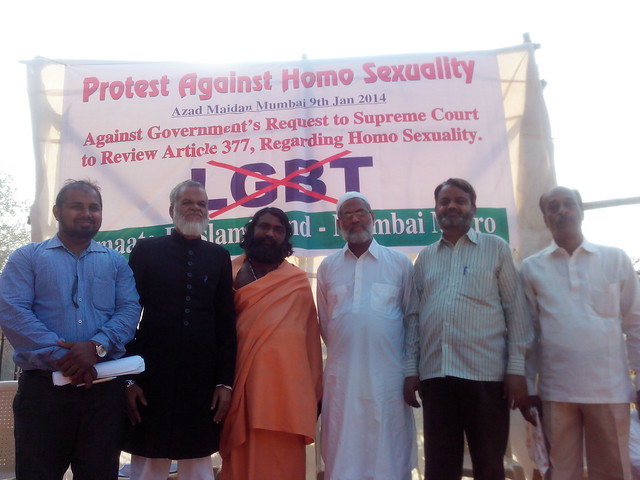


+in+the+Delhi+elections.jpg)








